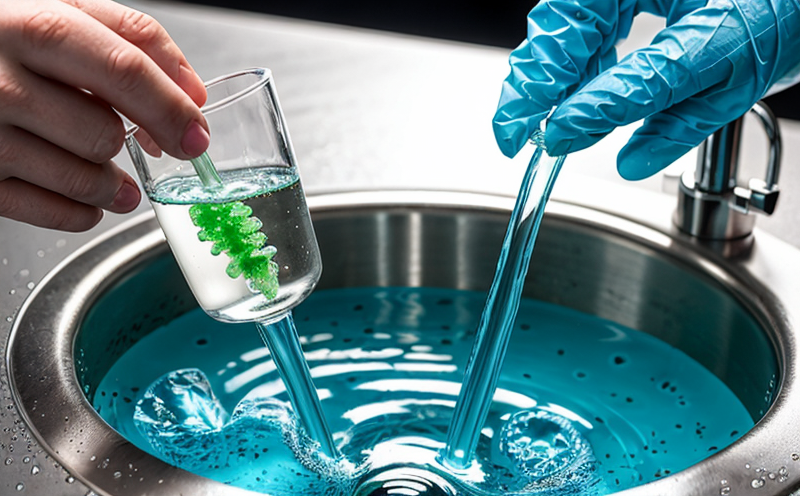ISO 10705-1 Bacteriophages Detection Test in Water
The ISO 10705 series of standards is one of the most recognized guidelines for detecting bacteriophages in water. This test is crucial for ensuring public health, especially given that waterborne diseases are a significant global concern. Bacteriophages—viruses that infect bacteria—are an important indicator organism as they can serve as early warnings to potential bacterial contamination issues.
The ISO 10705-1 specifically focuses on detecting bacteriophages in water, providing a standardized protocol for microbiological testing. This test is particularly relevant in the context of water treatment processes and wastewater management where the presence of these viruses can indicate the effectiveness of disinfection methods and the overall quality of water.
The methodology involves several critical steps that ensure accurate detection:
- Sample collection: Properly collecting water samples from different points within a distribution system is vital. Samples should be collected in sterile containers to avoid contamination.
- Preparation: The samples are then prepared according to the ISO standard, which involves neutralizing any residual disinfectants and adjusting pH levels.
- Detection: Using advanced techniques such as plaque assays, bacteriophages are detected by their ability to form plaques on a bacterial host strain.
- Validation: The results of the plaque assays are validated using statistical methods to ensure reliability.
The importance of this test cannot be overstated in sectors such as public utilities, pharmaceuticals, and food processing. Public utilities need to ensure their water supplies meet safety standards set by health authorities. In the pharmaceutical industry, it is critical for ensuring that the production environment remains free from contamination. For the food sector, compliance with these tests ensures product safety.
The process of detecting bacteriophages in water is not just about identifying the presence of these viruses; it also serves as a broader indicator of microbial quality and potential risks. By adhering to ISO 10705-1 guidelines, laboratories can provide reliable data that helps stakeholders make informed decisions.
Why It Matters
Waterborne diseases caused by bacteriophages pose a significant public health risk and are responsible for numerous illnesses worldwide. Detecting these viruses is essential to prevent outbreaks and ensure water quality. The ISO 10705-1 standard provides a robust framework that enhances the accuracy of detection, which is crucial in maintaining safe drinking water standards.
Public utilities rely on this test to monitor their water treatment processes and ensure compliance with regulatory requirements. In healthcare settings, ensuring that water used in patient care does not harbor these viruses is vital for preventing infections. The food industry also benefits from such testing as it helps prevent contamination of products leading to safer consumption.
The broader implications extend beyond public health; the environmental impact cannot be ignored. Properly managing water resources and minimizing contamination can lead to sustainable practices that protect ecosystems and human health alike. By leveraging advanced microbiological methods like those prescribed in ISO 10705-1, laboratories play a crucial role in safeguarding these critical resources.
Moreover, compliance with international standards such as this enhances the credibility of laboratory reports. This is particularly important for entities that need to meet regulatory requirements or gain international recognition for their products and services.
Eurolab Advantages
Eurolab prides itself on offering comprehensive microbiological testing solutions tailored specifically to the needs of its clients. With a team of expert microbiologists and state-of-the-art facilities, Eurolab ensures that every test conducted adheres strictly to international standards like ISO 10705-1.
Our commitment to excellence is reflected in our approach to sample collection and preparation, ensuring accuracy from the outset. Our experienced staff employ advanced techniques to detect bacteriophages efficiently and reliably. We provide detailed reports that not only list the presence or absence of these viruses but also offer insights into potential risks and recommendations for improvement.
Eurolab's extensive network allows us to deliver rapid turnaround times, ensuring that our clients receive timely results. Our dedicated support team is available round the clock to assist with any queries or concerns you may have regarding our services. Additionally, we ensure all data remains confidential and secure in accordance with GDPR regulations.
By choosing Eurolab for your microbiological water testing needs, you can be assured of receiving high-quality results that are both accurate and actionable. Our expertise and commitment to quality make us the preferred choice among leading organizations worldwide.
International Acceptance and Recognition
- ISO 10705-1: This standard has been widely adopted globally, ensuring consistency in methodology across different regions. It is recognized by regulatory bodies such as the World Health Organization (WHO) and various national health authorities.
- American Public Health Association (APHA): The APHAs reference ISO standards including ISO 10705-1, making it an essential tool for environmental scientists and engineers alike.
- European Union: EU directives require compliance with ISO standards when conducting water quality assessments. Compliance with these tests ensures adherence to EU regulations on drinking water safety.
The widespread acceptance of this test underscores its importance in maintaining public health and environmental protection around the world. By adhering to these internationally recognized guidelines, Eurolab contributes significantly towards achieving these objectives.





